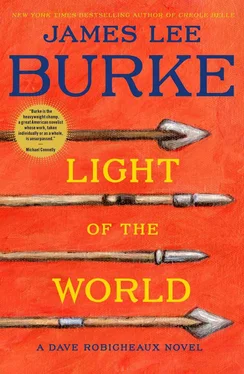Albert stared at her as though the floor were tilting under his feet.
“Did I say something wrong?” she asked.
“No, not at all.”
“Did you watch The Sopranos ?”
“A little bit.”
“That’s what the Mob is really like. The only honest work they can do is recycling garbage. Here’s the deal about that series. It’s not tragedy. The Godfather is. You know why people kept watching The Sopranos ?”
“No.”
“They wanted to see Tony Soprano find redemption. Too bad. Tony murdered his nephew and turned out to be a dumb shit who didn’t want redemption. I think the creators of The Sopranos did a number on their audience. Do you know what John Huston always told his people? ‘Respect your audience.’ ”
“Your ideas are interesting,” Albert said.
“That’s what people say when they’re grossed out and don’t know how to exit a social situation.”
He sat down, his hands propped on his knees, and looked at the frozen image on the television screen of Pope Alexander VI burning his archenemy alive. “You know what the hard road in Florida was?”
“A chain gang?”
“I spent a half year on one. I also did some time in a parish prison in Louisiana. Of all the boys I knew inside, I’d say only two or three of them were sociopaths. The rest of them could have led good lives if somebody had cared about them.”
“Why are you telling me this?”
“No reason. I think you’re an artist. I think you have a great future ahead of you.”
“How much of my history are you aware of, Mr. Hollister?”
“I don’t care about your past or anyone else’s. The past is nothing more than a decaying memory. Clete and Dave and his family think highly of you. That’s good enough for me. You tried to help Wyatt Dixon when he was tormented by that detective. That’s your history, that’s the woman you are. Don’t ever let other people tell you different. If they do, it’s for one reason only.”
“What?” she said, looking at him in a different way.
“They want you to lose.”
“I appreciate that,” she said.
“Advice is cheap,” he said. He climbed back up the stairs, silhouetted against the kitchen light, one hand on the rail, his shoulders and back as round and hard-looking as a stone arch.
She turned off the television and went outside into the twilight to check an infrared trail camera she had strapped to a tree trunk behind the house. The camera had a camouflaged housing that could be left for days or weeks or even months to capture images of wildlife passing through a stand of timber. The only technological downside was its inability to distinguish the movement of animals from the wind blowing through the trees and underbrush, causing the lens to click every fifteen seconds, until both the batteries and the space on the memory card were used up.
Gretchen loosened the canvas strap on the tree trunk and slid the camera out and used the viewing screen to click through the images on the memory card. She saw an elk with one eye pushed against the lens, a skunk, a flock of wild turkeys dropping from a tree, a cougar cub, and a black bear. Then a man.
Or what she thought was a man. The figure was erect, moving uphill, the head twisted away from the lens as though the figure had just heard a sound down below. The next photo had been taken fifteen seconds later. In it, the figure was deep inside the second growth and the black shade that fell on the mountain immediately after sunset, its dimensions impossible to estimate. She looked at the date and time the two frames had been taken. The figure had passed in front of the camera ten minutes earlier.
She showed no reaction. She slid the camera back inside its housing and notched the strap into the tree bark and walked downhill to the cabin. The temperature seemed to drop without warning or transition, and she tried to remember if there had been mention of a cold front on the weather report. She removed a flashlight from a kitchen drawer, took her Airweight .38 from under her mattress, and put on a coat and a shapeless cowboy hat. When she returned to the hillside, the light had gone from the sky, the moon was rising, and she could barely make out the abandoned logging road that ran beneath the cave where Asa Surrette might have camped.
She held the flashlight at eye level with her left hand, the Airweight in her right, and stepped onto the logging road. The air was dense and smelled of woodsmoke from a neighbor’s chimney. Down below she could see the lights inside Albert’s house and the shadows of the lilac bushes moving on the lawn. The wind shifted and began blowing out of the north, puffing the metal roof on the barn, scattering pine needles on the forest floor, filling the air with the cool smell of oxygen and humus and stone and lichen and toadstools that never see sunlight. She moved the flashlight beam through the trees that grew above the road and the cave. Where were the turkeys? Every night at sunset the entire flock, fifteen or so, went down to the creek in the north pasture and drank, then went back up the hill and roosted in tree limbs or around the trunks.
Her eyes were watering in the wind. Then she smelled an odor that was like humus but much stronger, as though its presence were heavier than the wind, as though it were ubiquitous and had settled into the stone and the tree trunks and the ground and the pine needles that carpeted the slope. Some people said that was what a griz smelled like. A griz stank of the deer it killed and buried by its den in the autumn and the deer it ate and defecated after it awoke in the spring. It stank of rut and the excrement it slept in, the blood that had dried on its muzzle, the fish it had swatted out of a stream and devoured, guts and all. The odor she smelled now was all these things and so thick she thought she might swoon.
“Are you there?” she said into the wind.
Her chest rose and fell as she waited for a response. She closed her eyes and opened them. Nothing is out there, she told herself.
Hi, baby doll. You’ve been kicking some serious ass, haven’t you? a voice said.
Her breath caught in her throat.
You’re more like me than you think. Remember how their eyes beg? You can do anything you want with them. You have power that no one else of the earth has.
“I’m nothing like you, you motherfucker,” she said.
Sticks and stones.
“Where are you?”
Inside your head. In your thoughts. In all the secret places you try to hide who you really are. You can never get to me unless you kill yourself.
“You don’t know me.”
You’re not a person, Gretchen. You’re a condition. You enjoy killing. It’s like an orgasm or your first experience with China white. Once you taste of forbidden fruit, the addiction never goes away.
“You’re not there.”
Keep telling yourself that, little girl.
“Show me your face.”
This time there was no answer. She was sweating inside her clothes. She approached the mouth of the cave, then stopped and tried to breathe as slowly as possible. She stepped in front of the opening, the flashlight shining inside, the Airweight pointed straight out in front of her. She could see the scorch marks of a fire on the walls and the ceiling, and the fresh droppings of bats and pack rats on the ledges and in the ash, but no sign of human habitation. The odor inside the overhang made her think of a dead incinerator in winter.
She backed out of the cave, into the wind, and clicked off the flashlight. “If you’re Asa Surrette, give me a sign,” she said.
She counted off five seconds, then ten, then twenty. She felt as though someone had looped a piece of baling wire around her head and inserted a stick in it and was twisting it tighter and tighter.
Читать дальше












